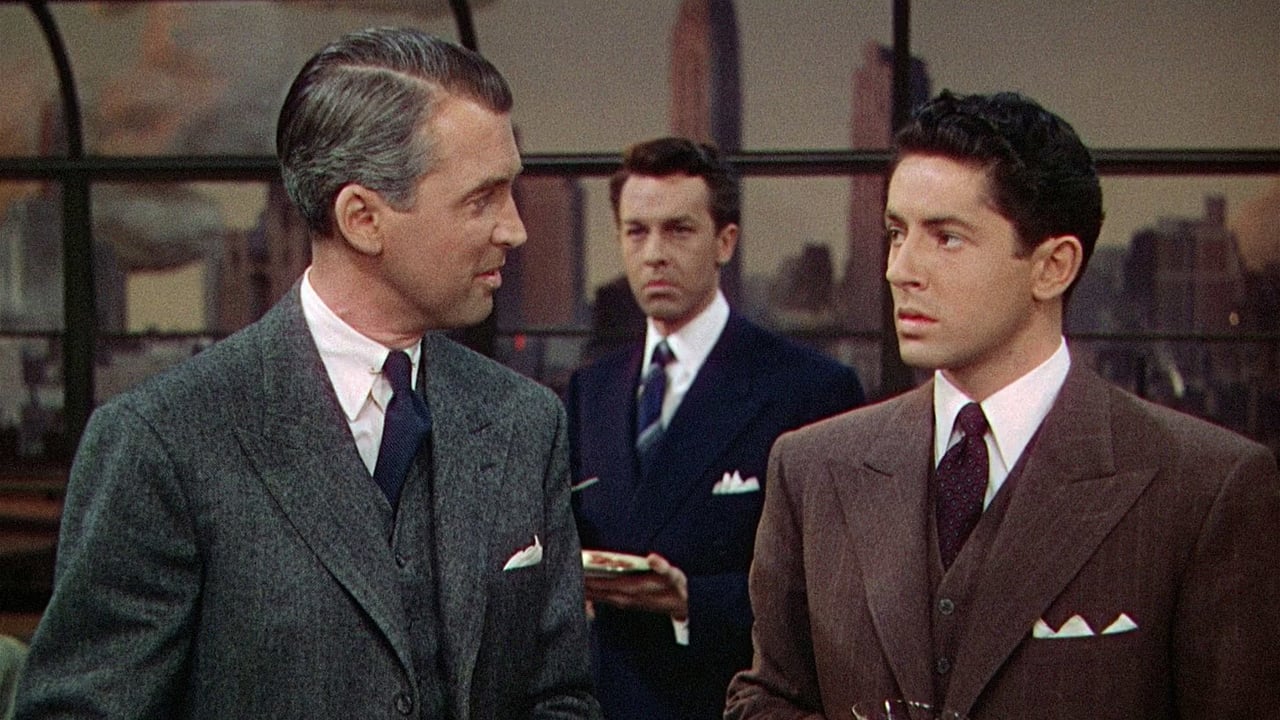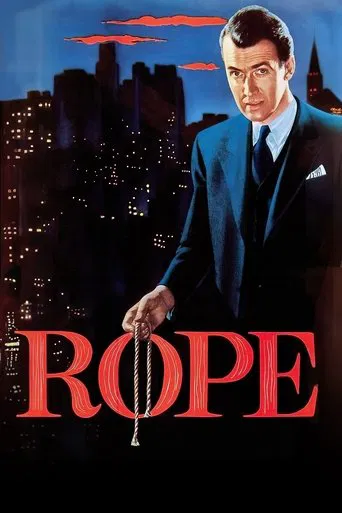

I've seen enough Hitchcock movies by now to determine for myself which ones are worth seeking out and which ones I shouldn't bother with. As brilliant as they may be labelled by critics and fans all around the world, I really can't get into Hitch's espionage or 'wrong-man-condemned' thrillers. I also find his more polished thrillers extremely boring, unrealistic and overrated, like "Vertigo" and "Rear Window". I'm primarily a horror fanatic, and thus love the nasty Hitchcock films the most, like "Psycho" and "Frenzy", but I'm also deeply intrigued by the more unorthodox and twisted tales of murder that the Master of Suspense brought forward, like "Strangers of a Train" or "Dial M for Murder". I made a shortlist of Hitchcock movies that I still want to see, and it only contains a few titles like "I Confess", "Stage Fright" and "Shadow of a Doubt". But at the top of that shortlist stood "Rope" because, as a fan of true crime stories, I really wanted to see Hitchcock's interpretation of the infamous and peculiar "Loeb-Leopold" murder case. "Rope" isn't a faithful re-enactment of the facts, and neither was the stage play on which Hume Cronym's screenplay is based, but the murderers' motives and behavior are certainly inspired by the shocking true facts. And it is a shocking case, mind you, and "Rope" faced a lot of controversy and the risk of being banned upon its release in 1948."Rope" is the story of two vain elite students, Brandon and Philip, who are so convinced of their own intellectual superiority that they insist on demonstrating the perfect murder can be committed. They select an inferior - according to their standards - victim, their college buddy David, and strangle him in cold blood with the titular rope. Strengthened by the belief they can get away with absolutely everything now, they subsequently hide the body in a chest in the living room and decorate it as a buffet for the party they are organizing that same evening! To complete the narcissism of their act, Brandon invites the victims' parents and fiancé as well as the university professor who always gave colorful lectures on how murder should be a work of art. During the "party", whilst literally all the guests are wondering why David isn't showing up, Philip grows increasingly paranoid about getting caught, while Brandon becomes more ruthless in dropping perverse clues about what they did. Professor Rupert Cadell (James Stewart) is the first guest to suspect poor David's real whereabouts. Seventy years after its release, "Rope" principally and mainly just gets remembered for being one of Alfred Hitchcock's most experimental films in terms of editing, settings and cinematography. It's certainly true that the Master accomplished a series of remarkable cinematic elements here. "Rope" exists only of 8-10 long and uncut takes (approximately 10-12 minutes per scene), the entire film takes place in only one décor (like a stage play), our director plays a lot with shadows and neon-light effects in his very first color film and there are several strange but extremely efficient POV camera angles (like when the maid clears the diner buffet while the rest of the group is having an off-screen discussion). All good, but please don't forget that "Rope" first and foremost has a brilliant script and literally oozes with genuine suspense from start to finish.
... View MoreI didn't like this movie at all and am surprised at how highly many people rate it, some even considering it among Hitchcock's greatest. First, it's less a movie than a filming of a stage play. Everything about it is stagey, from the often artificiality of the dialogue to the relentless confining of physical space to a couple of rooms. You can almost see the actors moving to their assigned places, fading toward the back of the stage or moving toward the front according to which conversation the audience is meant to hear. The use of close- ups is a transparent attempt to mask the fact that it's only a filming of a stage play.There's not a trace of believability in the premise of a professor insisting he is completely serious in his Nietzsche-like views about some people being above morality, expounded at length, thinking murder is actually entirely acceptable, but later shocked and horrified when confronted by a real murder. It's one of those stock pieces of artifice common to drawing-room mysteries.James Stewart excels at the end in his decency and humanitarian outrage after discovering that his former students have committed murder. But he is totally miscast in the earlier parts where is is supposed to be a professor overtaken by unconventional ideas about morality and murder. He puts on a slight smile, trying to present an air of intellectual superiority, but it doesn't work at all. It doesn't suit James Stewart-- not because we know James Stewart from other roles but because it is too far from the man's essential nature (or perhaps beyond his acting abilities). George Sanders or Clifton could have pulled it off, but not James Stewart.
... View MoreDespite his artistry, his achievements and his legacy, Alfred Hitchcock at a basic level was nothing but a mischievous kid who loved messing with his audience by making them involuntary participants in his films. In 'Rear Window', he managed to tap into the voyeuristic elements of a human psyche and made the audience a voyeur along with the protagonist 'Jeff'. In 'Rope', he manages to make the audience curious and maybe even a bit excited about the prospect of watching a crime go unnoticed and watching murderers remain uncaught. The character of Brandon is nothing but Hitchcock himself. It is stated time and time again, that the murder and the subsequent party in the film was arranged meticulously by Brandon because of the 'thrill' of it, the 'excitement' of it. Hitchcock is doing the same thing with this film from a technical standpoint. The screenplay is adapted from a play and Hitchcock stages the film pretty much like a play. 'Rope' is founded on the gimmick of making the whole film look like a long unbroken shot. Hitchcock is hiding the cuts and is reveling in the excitement of challenging the viewers to find the hidden cuts.'Rope' is also like the cinematic equivalent of 'Rear Window' due to the setting. Both films use the element of claustrophobia. The interiors of the apartment in 'Rope' could easily be one of the rooms/apartments that 'Jeff' was keeping an eye on in 'Rear Window'. There were various sections of the society that were captured in the little rooms and apartments that 'Jeff' was watching, this one could be the room that represents the upper class 'intellectual' section. 'Rope' certainly does make a commentary on the pretentiousness of some members of the rich upper class. Brandon keeps spouting Nietzschean philosophies to justify his right to murder as a 'superior' being. The closed-up, claustrophobic nature of the setting also visually underlines how isolated these people are with the rest of the society completely cut off, something which gets addressed in the final moments.Having said all that, the social commentary is secondary in the narrative. A complaint is made by people that 'Rope' is an example of style over substance and I think it's valid. It pretty much throughout remains a cinematic gimmick, an experiment, more so than anything else. We don't get the dark, multi-layered character studies that we got in 'Vertigo' and 'Psycho'. However I'll be lying if I say I didn't have a blast watching the film. I fully participated in Hitchcock's mischief, his hidden cuts, his careful placement of camera to raise tension, his cheeky visual foreshadowing, etc. It's an experiment of style over substance, but when it's none other than Hitchcock doing the experiment, it becomes fun, enjoyable and something that you have to admire.
... View MoreOldies were all about the script and the lines the actors say. No special effects, minimal gore, just plain old suspense, intellectual conversations and the details. This especially refers to the crime stories of the 1950s and 1960s and among them, the ones that made Alfred Hitchcock into one of the greatest film directors of all times. Rope" is one of the best situation thrillers placed inside a single room during its entire course. Two murderers who are inviting friends to a party just to serve them on a improvised casket just so they can indulge their urge to rejoice their successful endeavor is just a great concept as a standalone, but when joined by some meticulous dialogues and great acting (Stewart), the viewer gets a memorable movie experience that will echo in the cinematographic eternity. Rope" is one of the best movies Alfred Hitchcock made and one of the best murder mysteries ever.
... View More